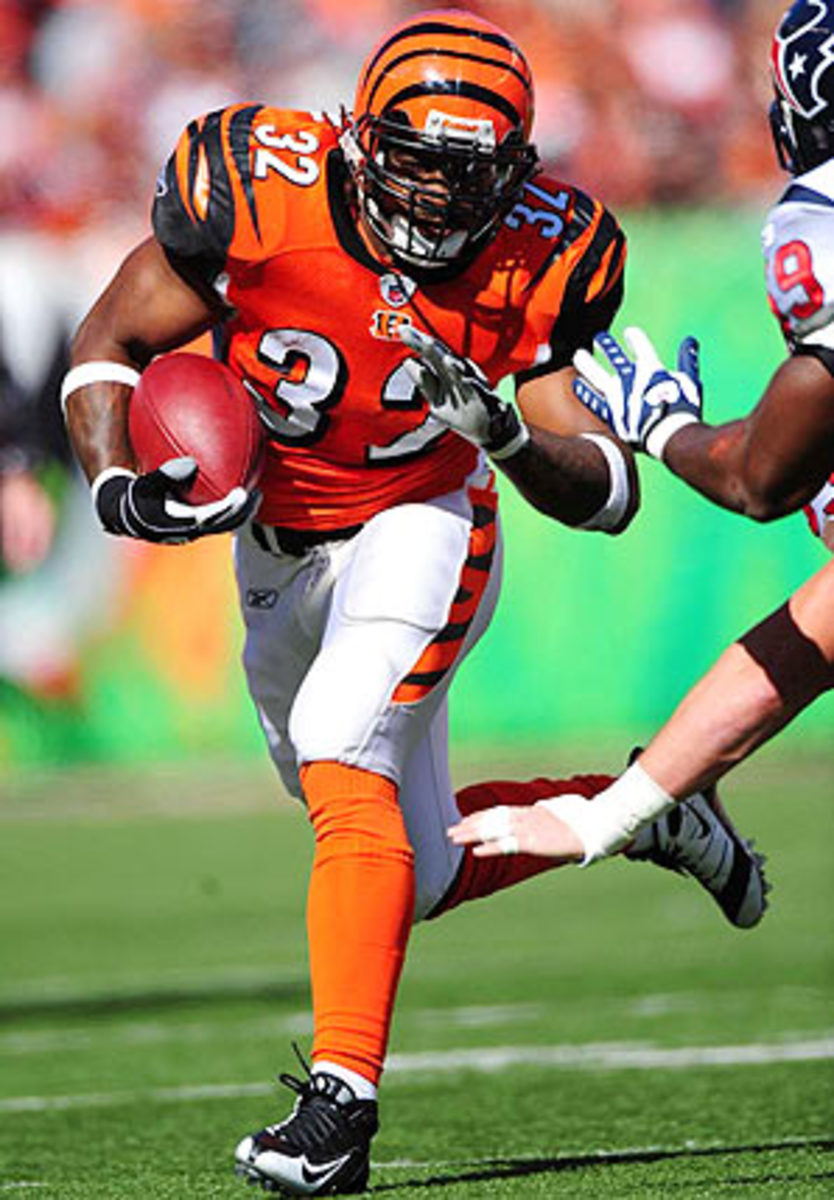
Learning from mistakes as a Bear, Benson is thriving as a Bengal
The Cincinnati Bengals are the halfway house of the NFL, the Grand Central Waystation for second chancers, last dancers and chronic screwups. The owner, Mike Brown, believes in extending lifelines, partly because they don't cost much, but also because he has a bit of savior in him. Brown once referred to himself as a "redeemer.''
There's no such thing as a bad boy in Cincinnati, especially if the Bengals can sign him for six figures and turn him around.
Some work, some don't. Take a bow, Chris Henry. Take a hike, Odell Thurman. And now, Cedric Benson. What has gotten into Cedric Benson?
After running for a career-high 189 yards last Sunday, against the team that released him, the Chicago Bears, Benson leads the NFL in rushing yards. In just over a year, he has gone from a perception -- slow, lazy, injury-prone -- to a star. All it took was. . . a trip to Cincinnati?
"People thrive when there's a feeling of acceptance,'' is how Benson explains it. "We all feed off positive energy.''
Well, OK. A happy Cedric is a productive Cedric. But it's not that simple. The Ced Story is equal parts desperation, motivation, coaching and diet. Yeah, diet. It turns out some of Benson's slow-riding in Chicago could have been food-related. We'll get to that. First, some background.
We'd heard about Benson. We thought we knew all about him, so when he signed with the Bengals on Sept. 30, 2008, the laughs were quick and derisive, a pie to the face. Bed and breakfast for wayward players welcomes another misfit. Looks like a love connection, Chuck.
Here's what we didn't know about Benson. Here's the side of the Ced coin that lost the flip in Chicago: He wanted to be a great player; he didn't know how. He'd tripped over his candor and his personality as a Bear. He'd learned the hard way. But he had learned.
He had no choice. Sitting at home a year ago in Austin, Texas, watching games on TV, Benson saw his career slipping away. We don't know what we've got 'til it's gone.
"It started with him maturing and understanding what it takes to be a professional,'' says his agent, Eugene Parker. "I knew what kind of player he was. I also knew with that cloud, there were going to be questions. Public opinion kind of convicts you.''
Benson showed up in Cincinnati for Game 5 last year, when the Bengals were a disaster in bloom, even for the Bengals. Carson Palmer was out for the year, the offensive line was a patch-wreck quilt. Benson hadn't been to training camp. He got a playbook and played five days after the team signed him.
He finished the season with 747 yards and admiration from his mates, who didn't know what all the derision was about.
That was last year. Now, Palmer is playing at a Pro Bowl level. The line is overachieving, the Bengals are 5-2 thanks in part to a veritable orphanage of second-chancers, most notably Benson.
Bengals coaches have preached patience. "Slow down, Cedric,'' the running backs coach Jim Anderson might say. "Wait for the hole to present itself.'' Allow the play to unfold, react to what the defense does. Don't be in such a hurry. It's all there for you. It isn't going away this time.
Benson hadn't learned to be patient. Not as a high school running back in Texas, where his 8,423 career yards are fourth-best ever. Fourth-best running back in Texas is like being fourth-best sunset on Waikiki. Lots to choose from. He hadn't learned to be patient at the University of Texas, where he ran for more yards than anyone but Ricky Williams. And not in Chicago. Certainly not in Chicago.
Benson was in such a rush to be a star in Chicago, he alienated half his Bears teammates and got himself cut at 25. Benson went from the fourth overall pick in the draft to out of the league, in three years. Talk about a man in a hurry.
Problem was, Benson ran to nowhere. His woes in Chicago are dusty news. Benson declared himself ready to replace popular incumbent Thomas Jones two games into his rookie year, even as he'd missed all of training camp while holding out. When Benson got his chance, he got hurt: Knee, shoulder, knee again.
In the spring of 2008, police charged Benson with boating while intoxicated and driving under the influence, both within a five-week span. Neither case went to trial, but that did it for the Bears. They released him in June. The man in a hurry had nowhere to go.
There could have been something else. Just after Chicago let Benson go, he was diagnosed with Celiac Disease, which various Web sites define as "a digestive disease that damages the small intestine and interferes with absorption of nutrients from food.'' Among the symptoms are anemia and fatigue.
People with Celiac can't tolerate gluten, a protein in wheat, rye, and barley. They can't eat pasta or cereal or drink beer. Benson has not mentioned Celiac as a cause for his lethargy in Chicago, but does say he has changed his diet significantly in the past year.
Regardless, the Benson in Cincinnati is not the Benson in Chicago. His story reminds us that perception is flawed reality. Lifelines are useful. Sometimes, they save careers. "You should always give people a second chance, or see how they come out the other end, before you judge,'' Benson said this week. "We learn from our mistakes. I just had to find how to make it work.''





